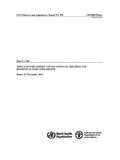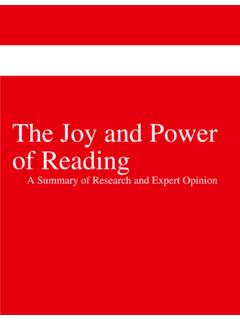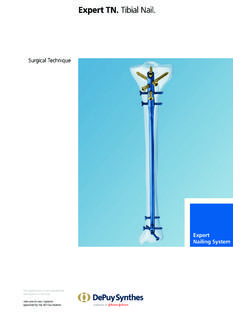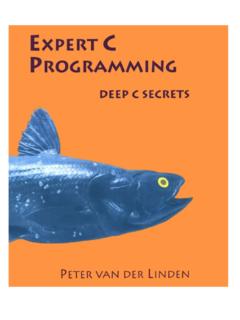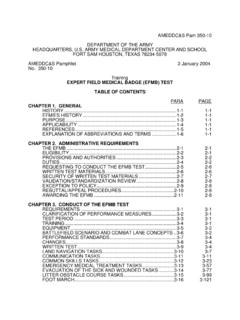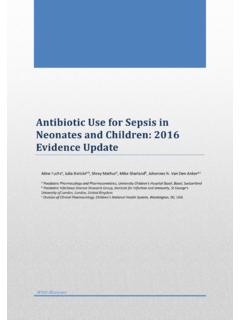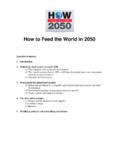Transcription of WHO Expert Committee on Specifications The …
1 WHO Expert Committee on Specifications for Pharmaceutical Preparations992 WHO Technical Report SeriesThe Expert Committee on Specifications for Pharmaceutical Preparations works towards clear, independent and practical standards and guidelines for the quality assurance of medicines. Standards are developed by the Committee through worldwide consultation and an international consensus-building process. The following new guidelines were adopted and recommended for use. Revised procedure for the development of monographs and other texts for The International Pharmacopoeia; Revised updating mechanism for the section on radiopharmaceuticals in The International Pharmacopoeia; Revision of the supplementary guidelines on good manufacturing practices: validation, Appendix 7: non-sterile process validation; General guidance for inspectors on hold-time studies; 16 technical supplements to Model guidance for the storage and transport of time- and temperature-sensitive pharmaceutical products.
2 Recommendations for quality requirements when plant-derived artemisinin is used as a starting material in the production of antimalarial active pharmaceutical ingredients; Multisource (generic) pharmaceutical products: guidelines on registration requirements to establish interchangeability: revision; Guidance on the selection of comparator pharmaceutical products for equivalence assessment of interchangeable multisource (generic) products: revision; and Good review practices: guidelines for national and regional regulatory Technical Report Series992 Forty-ninth reportWHO Expert Committee on Specifications for Pharmaceutical PreparationsThe World Health Organization was established in 1948 as a specialized agency of the United Nations serving as the directing and coordinating authority for international health matters and public health.
3 One of WHO s constitutional functions is to provide objective and reliable information and advice in the field of human health, a responsibility that it fulfils in part through its extensive programme of Organization seeks through its publications to support national health strategies and address the most pressing public health concerns of populations around the world. To respond to the needs of Member States at all levels of development, WHO publishes practical manuals, handbooks and training material for specific categories of health workers; internationally applicable guidelines and standards; reviews and analyses of health policies, programmes and research; and state-of-the-art consensus reports that offer technical advice and recommendations for decision-makers.
4 These books are closely tied to the Organization s priority activities, encompassing disease prevention and control, the development of equitable health systems based on primary health care, and health promotion for individuals and communities. Progress towards better health for all also demands the global dissemination and exchange of information that draws on the knowledge and experience of all WHO s Member countries and the collaboration of world leaders in public health and the biomedical ensure the widest possible availability of authoritative information and guidance on health matters, WHO secures the broad international distribution of its publications and encourages their translation and adaptation.
5 By helping to promote and protect health and prevent and control disease throughout the world, WHO s books contribute to achieving the Organization s principal objective the attainment by all people of the highest possible level of WHO Technical Report Series makes available the findings of various international groups of experts that provide WHO with the latest scientific and technical advice on a broad range of medical and public health subjects. Members of such Expert groups serve without remuneration in their personal capacities rather than as representatives of governments or other bodies; their views do not necessarily reflect the decisions or the stated policy of annual subscription to this series, comprising about four to six such reports, costs CHF $ (CHF $ in developing countries).
6 For further information, please contact: WHO Press, World Health Organization, 20 Avenue Appia, 1211 Geneva 27, Switzerland (tel. +41 22 791 3264; fax: +41 22 791 4857; email: order online: ).The International Pharmacopoeia, fourth 1: general notices; monographs for pharmaceutical substances (A O)Volume 2: monographs for pharmaceutical substances (P Z); monographs for dosageforms and radiopharmaceutical preparations; methods of analysis; (1500 pages), also available on CD-ROM and onlineFirst supplement: general notices; monographs for pharmaceutical substances; monographs for dosage forms; general and specific monographs; methods of analysis;International Chemical Reference Substances; International Infrared ReferenceSpectra.
7 Reagents, test solutions and volumetric (309 pages), also available on CD-ROM and onlineSecond supplement: general notices; monographs for pharmaceutical substances and radiopharmaceuticals; monographs for dosage forms; general and specific monographs; methods of analysis; International Chemical Reference Substances; International Infrared Reference Spectra; reagents, test solutions and volumetric (2013) and Fourth supplements as above and all supplements focusing on essential medicines including new monographs for antiretrovirals, antimalarials, antituberculosis and paediatric (CD-ROM and online)Basic tests for drugs: pharmaceutical substances, medicinal plant materials anddosage forms1998 (94 pages)Basic tests for pharmaceutical dosage forms1991 (134 pages)Quality Assurance of Pharmaceuticals.
8 A compendium of guidelines and relatedmaterialsUpdated, comprehensive edition, 2014 (CD-ROM and online)WHO Expert Committee on Specifications for Pharmaceutical PreparationsForty-eighth Technical Report Series, No. 986, 2014 (387 pages)International Nonproprietary Names (INN) for pharmaceutical substancesCumulative List No. 152013 (available on CD-ROM only)The selection and use of essential medicinesReport of the WHO Expert Committee (the 18th WHO Model List of Essential Medicines and including the 4th WHO Model List of Essential Medicines for Children).WHO Technical Report Series, No. 985, 2013 (219 pages)Biological StandardizationReport of the WHO Expert Committee on Biological StandardizationWHO Technical Report Series, No.
9 987, 2014 (266 pages)SELECTED WHO PUBLICATIONS OF RELATED INTERESTF urther information on these and other WHO publications can be obtained fromWHO Press, World Health Organization, 1211 Geneva 27, : +41 22 791 3264; fax: +41 22 791 4857; email: Expert Committee on Specifications for Pharmaceutical PreparationsWHO Technical Report Series992 This report contains the collective views of an international group of experts and does not necessarily represent the decisions or the stated policy of the World Health OrganizationForty-ninth report World Health Organization 2015 All rights reserved. Publications of the World Health Organization are available on the WHO website ( ) or can be purchased from WHO Press, World Health Organization, 20 Avenue Appia, 1211 Geneva 27, Switzerland (tel.)
10 : +41 22 791 3264; fax: +41 22 791 4857; email: for permission to reproduce or translate WHO publications whether for sale or for non-commercial distribution should be addressed to WHO Press through the WHO website ( ).The designations employed and the presentation of the material in this publication do not imply the expression of any opinion whatsoever on the part of the World Health Organization concerning the legal status of any country, territory, city or area or of its authorities, or concerning the delimitation of its frontiers or boundaries.










